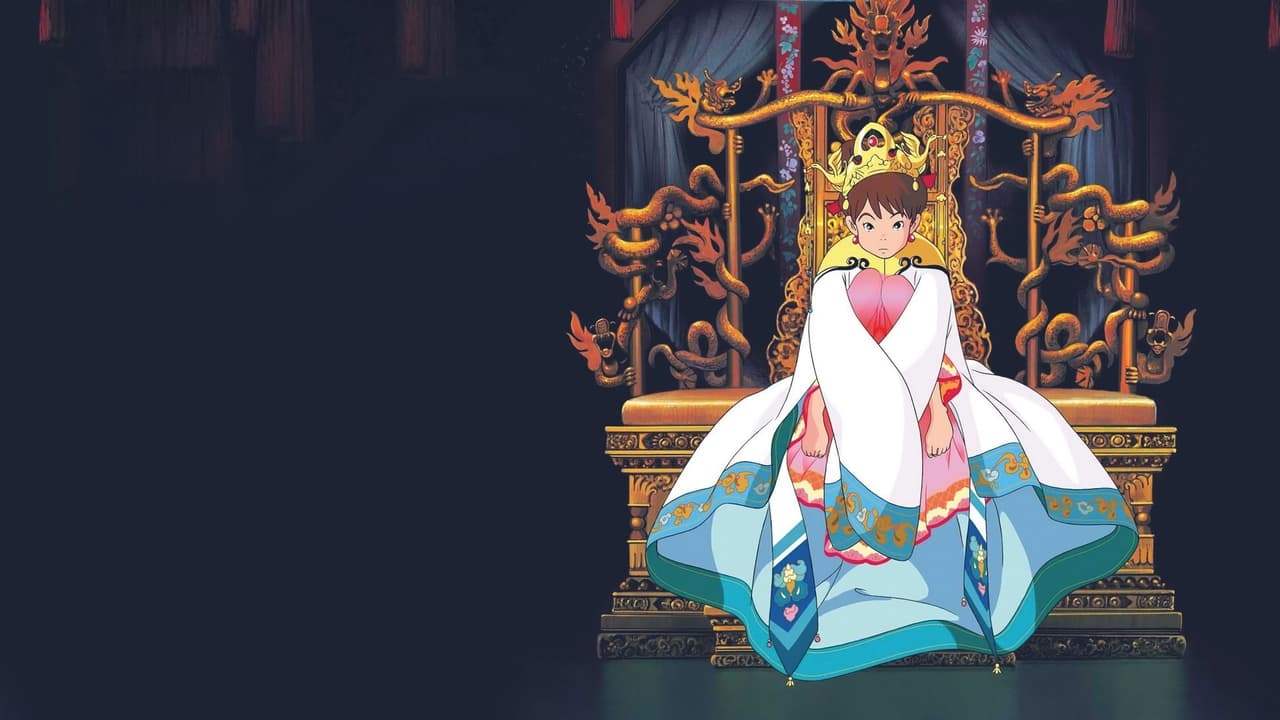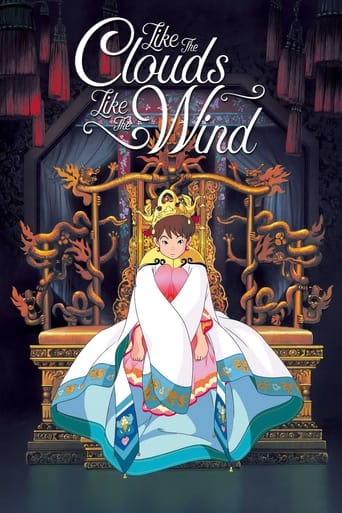

"Like the Clouds, Like the Wind" follows Ginga's story. She is an energetic and lively country girl who, one day, gets a shot at becoming one of the Emperor's wives.While I was watching it, I wasn't really thinking about how I felt about the movie. I just thought that it was a normal Japanese film- filled with cute animations and whatnot. But after having watched the whole film and letting everything sink in, I realized that this is quite a heavy film. Sure, it's not as sad as other films or as full of angst and drama as television shows, but it is quite heavy for a film associated with Studio Ghibli. I know Hayao Miyazaki didn't make this film, but hey, when media categorizes film like these under: "Non-Ghibli Films involving Studio Ghibli People", people can't help but associate them together! Which brings me to this: People who decide to watch this because they think that this is another one of Studio Ghibli's magical works are going to be in for a real disappointment and should really just exit this IMDb page now.I thought the animation was good for something done in the 90's. It reminded me of "Kiki's Delivery Service" and a bit of "Inuyasha". This movie also had lots of dry humor. Some were not entirely appropriate for children, though. Based from my own memory, I can remember about 1-2 sexual innuendos, 3-5 sexist jokes and lots of violence. It's not anything too harsh, though. The jokes can be overlooked and the violence wasn't gory at all. Just a few slashes and gunshots here and there.The worst thing about this movie was the pacing. It killed the movie. I was interested during the start, where all the girls were being taught by a teacher on how to become fit for an Emperor's wife and all that jazz. But my interest suddenly dwindled when the "plot" surfaced. It seemed very messy and put together too fast. The climax just happened. There was no build-up or anything. It made the film boring and inconsistent.Though the ending may not please everyone, I thought the ending was quite good. Not many films (animated, much less!) go towards that sort of route- the unhappy and open endings. I give the 4 stars for the first half of the movie and the ending. But besides those, I think that this is one Studio Ghibli-related movie that I won't be watching again any time soon.Viewed on: May 1, 2011
... View MoreDuring the 'dull, meandering' scenes people have mentioned, the film was laying out its politics, which I thought were great. This is the only anime I've seen where characters say it's natural for a man to love a man, or a woman to love a woman. And there's whole lot of cross-dressing and gender-bending going on, which Ginga treats as completely normal. I think this is a great anime for kids, which will counter some of the rigid masculine & feminine gender stereotypes so prevalent in most anime movies.There's also an interesting treatment of power politics. It's saying political power isn't worth it for its own sake, and it will destroy all who try to achieve it. So, although it's a film about a battle for the dynasty, it's a variation on the old "power corrupts" maxim. Which is, I think, another very positive message.
... View MoreFor three quarters of an hour, the story gradually develops towards a pivotal point of some sort. Although it is overburdened with scenes that just seem to be intended to dull the viewer and lure him away from the actual plot, there is something happening. It is not much and it certainly is not obvious. The combination of palace impressions and story-driving scenes do not add any depth or insight to the whole cast of characters. In fact, they keep them sterile as there is no character development at all. Everybody just remains spinning and centered around their own cliché and role - the cute, kinda headstrong girl; the fighting überwoman, the snobby aristocrat. The male lead does not seem to have any distinction at all, he is a shallow presence, which, actually, doesn't even matter as he is only there because the storyboard required him to - it seemed like he was on vacation and got caught up. When the point comes of turning the corner in terms of what happening, the movie first snaps completely blank for a couple of minutes and then becomes ridiculous. It solves - or better, dissolves - itself with a by-the-book Deus Ex Machina, more clichés and some of the most crude plot devices and choices I have ever seen. It's history, alright. First the movie's a drama though it's supposed to be comedic, and then it turns into a farce. The protagonists do what they are expected to do, and there are no surprises. The first set of somewhat serious antagonists however gets replaced by a couple that literally was just bored. Maybe that was some kind of nod towards the audience.This movie does not get any bonus from me for underlying philosophical meaning (since there is none) nor for its technical realization. The animation and editing is fair and so's the sound mixing; but it is by no means outstanding or even above the average Japanese productions of the late 1980's. In fact, the visual treats seem static, un-inspired and un-original.Worst of all - it totally fails to entertain, even if you don't bother with characters and all that stuff. There's too little going on here, and the rest is corny at best. Get a real Ghibli instead, have a feast with it and keep your fingers off this one.
... View MoreThis Movie was really worth its time - While the coloring of the clothes and other spaces may seem a little "flat" from time to time, the backgrounds, especially the grass and the palace buildings, were really well done. Still, this is no sen to chihiro or porco rosso, so, if only for its visual aspect, I wouldn't give more than maybe 8/10 - very good, especially for `89, but not at the top. Why did I still give it 10/10? Well, first, I wasn't sure If I should give 9 or 10, but this movie with its sad tone of come and go just hit right onto my mood - which made me turn to the 10. *Spoilers* First we see Grass, then a palace in ruins, then the story itself begins with the old emperors death, following the order of his few hundred wives being sent home. Now, his son needs to find a wife as fast as possible, to regain control over both Palace an Country. The eunuchs are beeing sent out, and several hundred young women start their training in the inner Palace. As 6 months go by, Only Ginga, the main character(a 13[?] year old girl) and a few others are left, and they marry the emperor, with Ginga as his first wife. But a rebellion starts, exploiting the emperors weakness - to make it short, the rebellion succeeds, the emperor kills himself, just after having sex with ginga once, the wives flee, and Gingas son will have to reunite the country some decades later...then, we go back to a destroyed palace, and the wide open grass in the wind. This circle of death and rebirth is the overall story of the movie, the underlying motive. I do not know much(if anything) about asian history, so I have not the slightest idea if these wars actually took place - given the fact that exact dates are being used, this is very well possible. To sum it up: No Hayao , But Akira Myazaki is close enough to it ;) The mood is not as sad as Hotaru no haka, due to the heavy use of funny scenes, but if you think about it, its no comedy either.
... View More